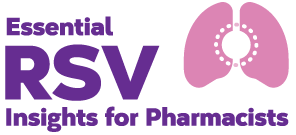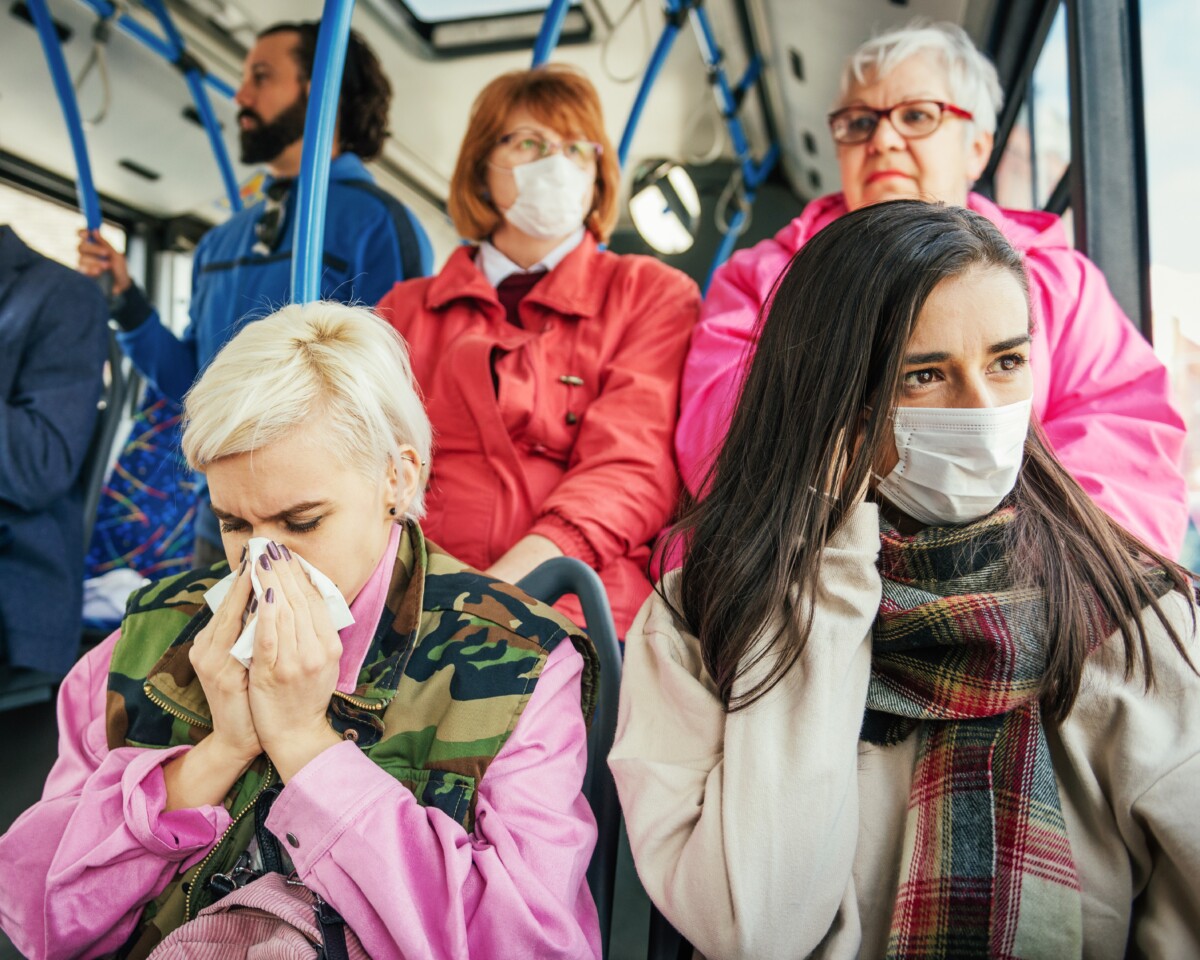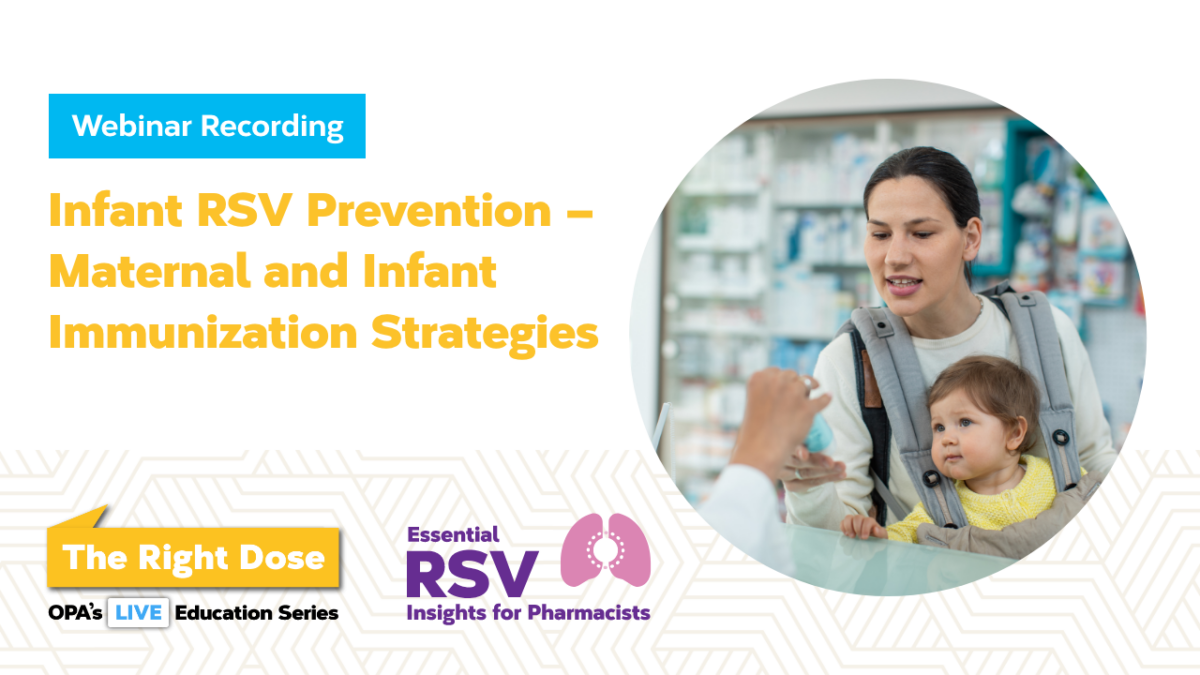
Respiratory Syncytial Virus (RSV) is a common viral infection that affects the respiratory tract. It’s a leading cause of respiratory illness in young children and older adults. RSV typically manifests as a common cold in healthy adults. For vulnerable populations such as infants, older adults and individuals with weakened immune systems, RSV poses a heightened risk often leading to more severe symptoms and complications.1
About Respiratory Syncytial Virus (RSV)
RSV symptoms can vary from mild to severe and may include:
- runny nose
- congestion
- cough
- shortness of breath
- wheezing
- fever
In addition to the symptoms above, infants with RSV may experience:
- irritability
- difficulty breathing
- decreased activity
- decreased appetite/feeding

Older patients and infants are particularly at risk of developing severe symptoms. RSV spreads through respiratory droplets when an infected person coughs or sneezes, through direct contact with infected individuals, or by touching contaminated surfaces and then touching the face.2
In Canada, incidences of RSV tend to be highest from late fall to early spring. Cases typically rise from mid-September to mid-November, peak from late December to mid-February, and decline from mid-April to mid-May.2
RSV Can Spread Through:
Coughs or Sneezes
Contact With Someone Who is Sick
with the Virus
Touching Contaminated Surfaces and then Touching the Face
RSV Diagnosis
Healthcare providers may suspect RSV based on medical history, symptoms, a physical exam or due to the time of year when the virus is usually circulating. In a hospital or long-term care setting, a nose swab can be done to confirm the diagnosis.3
In severe RSV cases that require hospitalization, additional testing may be needed. Imaging tests, such as a chest X-ray or CT scan can check for lung complications. Blood and urine cultures may also be performed to confirm diagnosis.3
RSV Risks, Lifespan and Impacted Populations
Individuals of all ages can get RSV, but the virus poses significant risks, especially to young children and older adults. In Canada, between 2017 and 2022, almost half (49.85%) of the 11,014 pediatric hospitalizations due to RSV were in babies younger than six months.4 About a quarter (23.6%) of all these hospitalizations led to intensive care, and most of those cases (60.8%) were in babies under six months old.4 Among adults, RSV is associated with an estimated 52.7 hospital admissions per 100,000 people over the age of 65.5 Furthermore, nearly 1/3 of patients hospitalized for RSV that are 75 years or older pass away within 1 year of their hospitalization.6 The burden on the healthcare system is considerable and highlights the importance of preventive measures.
In Canada, between 2017 and 2022, almost half of the 11,014 pediatric hospitalizations due to RSV were in babies younger than six months.
Among adults, RSV is associated with an estimated 52.7 hospital admissions per 100,000 people over the age of 65.
RSV typically manifests symptoms within 4 to 6 days of infection. Even in healthy adults, symptoms may be minimal while they are still able to transmit the virus to others. The contagious period for RSV-infected individuals generally spans 3 to 8 days, with recovery typically lasting 1 to 2 weeks.1 However, infants and those with compromised immune systems may remain contagious for up to 4 weeks, even after they stop showing symptoms.1 Individuals who are infected with RSV can get repeat infections.
The Role of Pharmacists in RSV Prevention
Pharmacists play a crucial role in RSV prevention through education, vaccination and medication counselling. They advise patients and caregivers about RSV transmission, symptoms and supportive measures. Pharmacists also have a crucial role in talking about prevention strategies, including hand washing, avoiding close contact with infected individuals, wearing masks, and vaccination and immunization options. Pharmacists can also administer RSV vaccines to eligible populations, such as expecting mothers and older adults, helping to boost community immunity. Additionally, pharmacists are in a position to identify individuals who are at risk and make appropriate recommendations, including discussion of vaccination of RSV and other respiratory conditions (e.g., influenza, COVID-19, pneumococcal), how to manage any comorbid chronic diseases in older adults, and over-the-counter consultation for acute respiratory illness. By actively engaging in RSV prevention efforts, pharmacists contribute significantly to reducing the burden of this common respiratory illness.
OPA has been instrumental in expanding the scope of Ontario pharmacy practice to include RSV vaccination. Since December 12th, 2023, Part A pharmacists, interns, pharmacy students, and pharmacy technicians have been authorized to administer RSV vaccines to patients aged five and older.
RSV Vaccines for Protection and Prevention

To effectively prevent the spread of RSV, it’s important to cover coughs and sneezes, wash hands frequently with soap and water, maintain distance from sick individuals, wear masks, avoid touching the face, clean frequently touched surfaces, and seek medical advice for persistent cold-like symptoms.
Getting vaccinated can help with preventing hospitalization and provide additional protection against RSV. Several RSV vaccines are available in Ontario and pharmacists must be knowledgeable about these vaccines and any special considerations for vulnerable populations, including immunocompromised individuals.
Currently in Ontario, the publicly funded RSV vaccine is available to individuals aged 60 and older who are at high risk and reside in specific settings. Individuals who do not qualify for the publicly funded RSV vaccine can still purchase the vaccine with a prescription from their family doctor or other primary care provider. Some private insurers may cover all or part of the cost of the vaccine.
There are various options to prevent RSV that are Health Canada approved.
- AREXVY is a vaccine that protects people 60 years and older from lower respiratory tract disease caused by RSV.7
- ABRYSVO is a vaccine that prevents lower respiratory disease from RSV in adults 60 years and older. ABRYSVO is also indicated to be given between 32 and 36 weeks of pregnancy to prevent RSV in babies from birth through 6 months of age.8
- BEYFORTUS (nirsevimab) is an immunization for the prevention of RSV disease in all newborns and infants during their first RSV season, and children up to 24 months of age who remain at risk of severe RSV disease through their second RSV season.9
- SYNAGIS (palivizumab) is an immunization for the prevention of serious lower respiratory tract infection caused by RSV in pediatric patients at high risk of RSV disease.
Tips for Patient Education and Counselling
Pharmacists should be prepared to address patient questions and concerns about RSV and the vaccine. This includes integrating vaccine counselling into pharmacy workflows and effectively communicating the statistics and effects of RSV, as well as the benefits of vaccination. Additionally, pharmacists should be equipped to handle vaccine hesitancy by providing accurate information and addressing misconceptions.
Pharmacists play a vital role in RSV prevention through advocacy, vaccination and patient education. By leveraging their expertise, pharmacists can contribute significantly to reducing the burden of RSV on individuals and the healthcare system.
Educational Programs and Resources
Register for OPA's upcoming live webinars in this series
- Live Webinar
- August 28, 2024
- Live Webinar
- September 5, 2024
- Live Webinar
- September 19, 2024
- Live Webinar
- August 29, 2024
- Live Webinar
- September 11, 2024
- Live Webinar
- September 26, 2024
Sign up for all webinars with one simple registration process.
OPA courses and webinar recordings
Not an OPA Member? Join now and get access to leading professional development programs, exclusive member benefits, advocacy and pharmacy news and best-in-class insurance. Join Now!
This signature learning series is supported through an education grant from Pfizer Canada, Sanofi Canada and GSK Canada and is intended for healthcare professionals only.
References
- Mayo Clinic Staff. (n.d.). Respiratory syncytial virus (RSV) – Symptoms and causes. Mayo Clinic. https://www.mayoclinic.org/diseases-conditions/respiratory-syncytial-virus/symptoms-causes/syc-20353098
- Arexvy. (n.d.). About RSV. Arexvy. https://arexvy.ca/en-ca/about-rsv/
- National Library of Medicine. (n.d.). Respiratory syncytial virus infections. MedlinePlus. https://medlineplus.gov/respiratorysyncytialvirusinfections.html
- Bourdeau, M., Nirma Khatri Vadlamudi, Bastien, N., Embreé, J., Halperin, S. A., Taj Jadavji, Kazmi, K., Langley, J. M., LeBel, M., Nicole Le Saux, Moore, D., Morris, S. K., Pernica, J. M., Robinson, J., Sadarangani, M., Bettinger, J. A., & Papenburg, J. (2023). Pediatric RSV-Associated Hospitalizations Before and During the COVID-19 Pandemic. JAMA Network Open, 6(10), e2336863–e2336863. https://doi.org/10.1001/jamanetworkopen.2023.36863
- Mac, S., Shi, S., Millson, B., Tehrani, A., Eberg, M., Myageri, V., Langley, J. M., & Simpson, S. (2023). Burden of illness associated with Respiratory Syncytial Virus (RSV)-related hospitalizations among adults in Ontario, Canada: A retrospective population-based study. Vaccine, 41(35), 5141–5149. https://doi.org/10.1016/j.vaccine.2023.06.071
- Ackerson B, Tseng HF, Sy LS, et al. Severe morbidity and mortality associated with respiratory syncytial virus versus influenza infection in hospitalized older adults. Clin Infect Dis 2019;69(2):197–203.
- Arexvy. (n.d.).Why Arexvy? https://arexvy.ca/en-ca/why-arexvy/
- Pfizer Canada. (2023). Product Monograph Including Patient Medication Information. ABRYSVO. https://webfiles.pfizer.com/file/b3cae670-abaf-4567-94de-6c5997272d2b?referrer=ccb731e5-4f2d-4f4a-b2dc-e5e912145fc6
- Health Canada approves BEYFORTUSTM (nirsevimab) for the prevention of RSV disease in infants – Apr 24, 2023. (n.d.). Sanoficanada.mediaroom.com. https://sanoficanada.mediaroom.com/2023-04-24-Health-Canada-approves-BEYFORTUS-TM-nirsevimab-for-the-prevention-of-RSV-disease-in-infants




